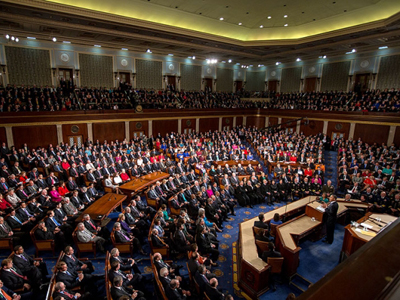NEWS ANALYSIS: US AID
SOTU 2014: Share your vision for US foreign aid

U.S. President Barack Obama delivers the State of the Union address at the U.S. Capitol House Chamber last year Feb. 12, 2013, where he pledged to help eradicate extreme poverty. Will he expand on his pledge this year? Photo by: The White House
The U.S. president’s annual State of the Union address tends to shun international development issues and instead focus on domestic priorities and national security.
And yet, the speech can set the political agenda and galvanize support for ambitious reform projects like President Barack Obama’s pledge last year to eradicate extreme poverty by 2030 — a cause that has since been taken up by the World Bank and others around the globe.
On Tuesday, the eve of this year’s SOTU, Devex asked several Washington insiders to imagine what they’d want the president to say if his speech contained a detailed section on development cooperation.
We’ll be updating this post throughout the day as your submissions continue to roll in. Let us know what you would like to see in the president’s speech — and your reactions after it happens — by emailingnews@devex.com or tweeting @devex.
Here are a few thoughts from your development experts in and around Washington:
Jim Kolbe, former congressman from Arizona and senior transatlantic fellow at the German Marshall Fund, said that he hoped Obama would offer, “a call to inspire the American people to return to a role of leadership in world affairs and not turn their back on the world we live in and see around us.”
“Americans have grown weary of carrying this burden, but there is no other country capable of performing that role,” Kolbe wrote. “The world we live in today is more dangerous and unstable that at any time since the end of the Cold War, and requires our leadership.”
Dan Runde, William A. Schreyer chair and director of the Center for Strategic and International Studies’ Project on Prosperity and Development, offered this vision for the future of U.S. pro-democracy efforts: “We will be uncompromising in expanding freedom in the world.”
He added: “Political dissidents in Ukraine, Belarus, Iran, Venezuela and Cuba and elsewhere will have no better friend than the United States of America. The work of creating democracy is slow and often hard. Many governments seek to thwart us and have become more sophisticated in holding back the tide of history. At the same time, religious minorities need to be protected. Ethnic cleansing of Christians in the Middle East is morally wrong and we will work to stop it.”
Greg Adams, Oxfam America’s director of aid effectiveness, offered his take on Obama’s development leadership — and what it has been missing so far.
“Tonight, I am not looking for new development ideas from the president; we want to know his political strategy for making his existing ideas happen,” Adams wrote to Devex.
“The Obama administration has done much to strengthen American efforts to end poverty. President Obama is one of the most articulate advocates for global development that has ever served in the U.S. government. And his administration has put in place real policy reforms that have strengthened American development leadership on the ground. But for tonight’s State of the Union, I am hoping that the president focuses on shoring up the politics behind U.S. leadership in the fight to end poverty,” Adams added. “Ironically, effective development policy has been a rare area of bipartisan agreement for almost a decade. The president should use the State of Union to capitalize on this bipartisanship and ensure the success of his reform agenda.”
Randal Mason, director of strategic partnerships at IREX, submitted on behalf of his organization: “The U.S. recognizes that the long-term success of poverty reduction, economic development, and improved public health, depends on countries having strong, effective, and participatory governance. We will prioritize and increase support for the elements of a well-governed society — a robust civil society sector, a strong and independent media, free and fair elections, and protection of fundamental rights.”
The Center for Global Development, a Washington D.C.-based think-tank, issued its own internal wish-list for Obama’s address, breaking down foreign aid priorities sector-by-sector.
CGDev President Nancy Birdsall suggested the president say the following: “Last year I called for an end to extreme poverty in the world by 2030. That end is in our sights. But inequality is rising not only here in the United States, but in China and India, in Europe and in Africa. To achieve real progress in tackling this pernicious challenge, we need to put the fight against inequality on our global agenda, as well as our domestic one.”
Birdsall was not alone in shining a light on rising inequality as an international development issue.
Sam Worthington, CEO and president of InterAction, suggested the president address global inequality in his speech: “We need to advance a more equitable world, both at home and abroad.”
Liz Schrayer, executive director at the U.S. Global Leadership Coalition, an industry association lobbying for a robust foreign affairs budget, suggested Obama use the speech to “define” his presidential “legacy” on development issues. Schrayer cited former President George W. Bush’s launching of the President’s Emergency Fund for AIDS Relief, which has helped funnel more than $52 billion to HIV/AIDS programs around the world.
“Tonight, President Obama has the opportunity to define his legacy of changing the course of millions of lives around the world. That’s a speech everyone will remember and all parties can agree on.”
Read more on U.S. aid reform online, and subscribe to The Development Newswire to receive top international development headlines from the world’s leading donors, news sources and opinion leaders — emailed to you FREE every business day.
No comments:
Post a Comment